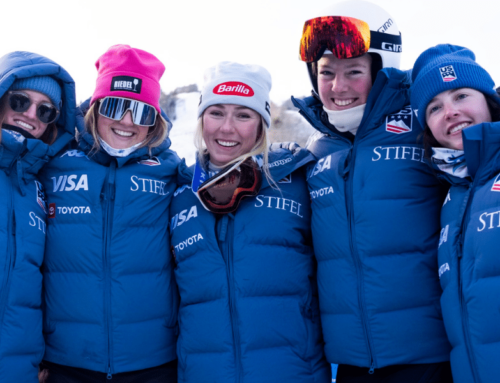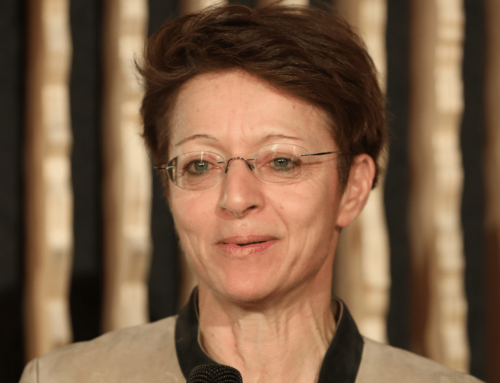IOC proposes double award of 2030 and 2034 Winter Olympics among changes to address “very concerning situation”
As reported in GamesBids.com Photo: GEPA pictures/ Patrick Steiner
The International Olympic Committee (IOC) says time is running out for the Winter Olympics due to the effects of climate change and it must act quickly to address this “very concerning situation”.

That’s why the IOC Executive Board (EB) Friday proposed a double awarding of the 2030 and 2034 Olympic and Paralympic Games on an expedited timeline among other changes that could follow to preserve the quadrennial event. IOC president Thomas Bach said in a press conference that qualified regions interested in hosting any of the two editions would be proposed for ‘targeted dialogue’ by the end of October or in November, then the EB would approve any or all of the choices of the Future Host Commission at its meeting set for November 28 to December 1 in Paris.
The final election for 2030 and 2034 would be held at the 2024 IOC Session to be held in Paris next year ahead of the Olympic Games in July.
At a quarterly EB meeting that was held in Mumbai, India ahead of the all-members Session kicking off Saturday, the Future Host Commission of the Winter Games delivered two studies that were requested by the EB last December. It concluded that by 2040 only 10 National Olympic Committees (NOC) would have the climate and venues to support the Olympic and Paralympic Games.
Commission Chair Karl Stoss presented two criteria later approved by the EB that include only considering bids that propose the use of existing or temporary venues and where snow competition venues are deemed climate reliable until at least the middle of the century.
“There are 15 NOCs on three continents that have at least 80 percent of existing venues, which means that they have at least nine out of the 11 required venues. Ten out of the 15 NOCs have either recently hosted the Games or are interested to host the Games in the future,” Bach said.
“By 2040, in Olympic terms tomorrow, two of these 15 NOCs will no longer have the necessary reliability for the Olympic Winter Games held in February and five even for the Paralympic Winter Games held in March.
“We need to address this dramatic impact of climate change.
“This is a very complex issue and to address this in a proper way we need some more time.”
The double allocation, Bach said, is the way to buy more time to solve these problems – but he didn’t suggest specifically how awarding both Games next year would help solve the climate change issue.
Three projects, including from Sweden, Switzerland and France are developing bids for future Games. Earlier this week Sapporo dropped out of the 2030 race due to the Tokyo 2020 corruption scandals, suggesting it could instead vie for 2034. But with Friday’s developments it seems unlikely that the Japanese city would be able to pivot to 2034 by next month with the negative public sentiment over the scandal still prevailing.
The double allocation seems more likely to appease the United States’ bid from Salt Lake City that is targeting 2034 instead of 2030 to distance it from the Los Angeles 2028 Summer Games to maximize revenue potential. However Salt Lake City bid chair Fraser Bullock told Sports Business Journal this week that he needs some indication that his bid is on the right track before the opportunity gets stale.
“Fortunately, the people of Utah are very supportive of the Olympics and Paralympics. However, holding that interest indefinitely would be incredibly challenging. That’s why we are hoping for progress this year,” he said.
Further complicating matters is an Olympic Charter rule that prevents a region from being elected Games host at a Session in its own territory. If the Future Host Commission were to select France to enter targeted dialogue for 2030 or 2034, holding the election as planned at the Paris Session next year would be against IOC regulations.
Bach refused to explain how the IOC might handle the situation with the French NOC that visited IOC headquarters in Lausanne in September to promote the bid and received endorsements from 100 political leaders across the country last week. The president countered that there was no issue and that the scenario was strictly “hypothetical”.
Last week Switzerland received a slim majority of public support in nationwide poll. In Sweden, officials hope they can leverage their defeated Stockholm Åre 2026 bid to propose a more viable project for the IOC.
Bach said the Future Host Commission has already begun working on a climate strategy “to address this very concerning situation” that will include “deliberations on rotation, the composition of the program, the different needs for sports on ice and snow and many others.”
It was suggested last year that the IOC could name a list of climate and venue capable regions to include in a permanent pool of hosts for rotation in the foreseeable future. On Friday Bach added that there might be a need to address the program that relies on snow and ice.
Bids from Vancouver in Canada and jointly between Barcelona and the Pyrenees in Spain dropped out of the running for 2030 last year due to internal political issues. Opponents in the Pyrenees were opposed to the plan, they said, because it would transform the local economy towards sports tourism that would eventually fizzle out due to the impacts of climate change in the region.
Milan-Cortina in Italy is set to host the next Winter Games in 2026.













